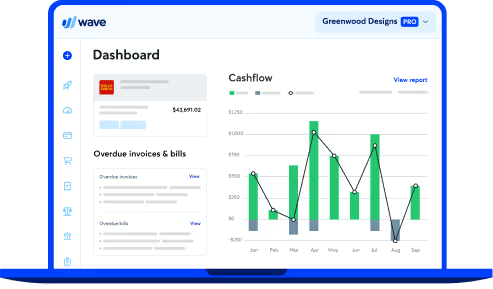
How to get inspired when you want to start a business
This article is part of our How to start a business playbook, which covers topics like finding the right business idea, writing a business plan and finding small business loans.
So you want to be an entrepreneur. You’ve got big dreams of starting your own business and watching it grow into something truly great. That’s absolutely possible, but it’s going to take a lot of hard work and dedication to push through the challenges ahead of you.
The best first step for any aspiring entrepreneur is to take some time to really get inspired, and start building a community of successful people to support and motivate you along the way. This step gets overlooked a lot, but it’s the key to helping you turn a dream into a goal—something you can plan out and actually tackle.
Business inspiration isn’t just about getting fired up inside—it’s also about building an understanding of what it takes to launch and run a successful business. It’s about finding the information and community you’ll need for support along the journey.
In this chapter, we’ll chat about why inspiration is such a difference-maker when it comes to launching and running a business. We’ll cover where to find business inspiration, how current business owners were inspired to launch, and how to channel that inspiration into concrete action toward building your business.
Let’s dive in!
Why inspiration is key to business success
When we talk about inspiration, it’s a lofty concept. You can’t measure inspiration or calculate the direct return on investment. So why is it such an important ingredient for a successful business?
The answer is that inspiration makes it possible for us to do things we otherwise wouldn’t. Inspiration is the motivating factor that spurs us to start or continue working toward our goals. It helps us set those goals. Inspiration is what takes you from someone who had an idea to a full-blown business owner.
In addition to motivation, inspiration has a boosting effect on creativity, too—making for more effective problem solving. Harvard Business Review notes, “Mastery of work, absorption, creativity, perceived competence, self-esteem, and optimism were all consequences of inspiration.” In a study done on the effects of inspiration, researchers found that inspired people saw themselves as more creative. And their self-rating of creativity actually increased over time.
Starting a business is a daunting task—it’s easy to find excuses for why you can’t succeed or why you’ll start tomorrow. Being inspired helps cut through these excuses. It makes it easier to forge ahead and begin taking real action toward starting your business.
How to get inspired
Most of us understand and respect the motivating power inspiration can have. After all, we’ve all felt it at one time or another. But we often view inspiration as something we either happen upon or don’t.
The truth is, you can actually seek out inspiration and put it to work for you. In the article we mentioned earlier, Harvard Business Review cited recent research showing “inspiration can be activated, captured, and manipulated, and it has a major effect on important life outcomes.”
The first step in harnessing inspiration to help drive your business is to go out and find it. Here’s how to do just that.
Network
If you just groaned at the thought of “networking,” we hear you. But when it comes to finding inspiration, there’s no substitute for getting out there, meeting new people, and listening to their stories.
A strong community of like-minded small business owners can help inspire you, hold you accountable to your business goals, and provide invaluable advice on the ins and outs of entrepreneurship. And building that network doesn’t have to be dreadful. Here are a few ways to painlessly grow your entrepreneur community:
- Go to a community event. Many places have established business communities that meet regularly or hold events. For example, Freelancers Union has chapters throughout the United States and puts on monthly SPARK events for freelancers to meet, share, and learn from one another. If you aren’t sure what exists in your area, try searching on Meetup.
- Join an online group. If local, in-person groups aren’t your style, consider joining an online community. Facebook has loads of small business-minded groups to choose from. The Creative Class grants access to a private Slack community of fellow creative business owners. If you aren’t sure where to find an online community, ask colleagues what groups they’re part of and take a look around LinkedIn.
- Find a mentor. A wide network of like-minded peers comes in handy, but inspiration also abounds from a one-on-one mentor relationship. A dedicated mentor can help keep your spirits up through the tough times, identify your blind spots, and celebrate successes with you. You can find a mentor by building relationships on Twitter and LinkedIn, working with your local SCORE, Chamber of Commerce (if you’re in the U.S.), or BNI chapters, or chatting with small business experts on Clarity.fm.
Read
Inspirational stories can help us put our own doubts and adversity into perspective. When you read a story about paralympic athletes and the obstacles they’ve overcome, the idea of going for a two mile run seems a lot easier.
Reading—books, magazines, blogs, op-eds—exposes you to the stories of other entrepreneurs. Entrepreneurs who’ve faced the same obstacles you do, and prevailed. Business owners who’ve revolutionized industries in the same way you hope to change yours. Entrepreneurs who faced a much steeper climb than lies ahead of you.
Reading about breakthrough businesses, innovative industries, and extraordinary entrepreneurs is one of the best ways to find the inspiration to kick start your own business dream. Here are a few recommendations to get you started.
Books
Rand Fishkin founded one of the most influential companies in the search engine marketing world. His book delivers exactly what it promises: a painfully honest and realistic look into the world of startup and small business.
- Outliers: The Story of Success by Malcolm Gladwell
In Outliers, Gladwell dissects the secrets of some of the most successful and revered people across history—from professional athletes to business tycoons. He seeks to explain why high-achievers become so successful, and what the rest of us can learn from it.
- Reinvent Yourself by James Altucher
James Altucher has been a lot of things over the course of his life. In Reinvent Yourself, he shares those experiences—as well as the stories of countless other successful entrepreneurs, artists, and leaders—as a way of proving that the most successful among us are champions of reinvention.
Magazines
Blogs
Their mission is to help business professionals establish themselves as thought leaders, increase exposure for their businesses, and network. Its 10,000+ members are expert contributors who help each other stay on top of industry news and trends, and share real-life experiences.
Jason Shen writes all about how businesses develop a competitive advantage, sharing his and other entrepreneurs’ experiences on this blog. Find a list of his most favorite pieces on the About page.
Entrepreneur Interviews is dedicated to one thing: empowering real life business owners to share their stories. The blog offers exactly what it sounds like—interviews and stories with business owners from all walks of life, sharing their experiences with things like finding the right business idea, getting funding, and putting together an A+ team, among other topics.
Start fresh
After a while, even the most inspirational stories, repeated over and over, start to lose their impact. When you’re feeling stuck or burned out, the best medicine is to try something completely new. In fact, trying new things has been shown to boost creativity and problem-solving ability—a win-win when you’re starting a business!
- Discover a new industry. Oftentimes when we search for inspiration, we look for stories, people, or companies similar to us. That’s helpful sometimes, but learning about a completely new industry has its own benefits. Try picking up a book or reading a magazine about a topic you’ve never heard of or had experience with.
- Pivot your career or refocus your role. If your current job offers you the flexibility to learn new skills, take on extra responsibilities, or try out other roles, take advantage! Get away from the same old same for a few days and see what inspires you outside your day-to-day routine.
- Try something new outside of work. Inspiration doesn’t have to come from work. Getting outside, trying a different activity, taking a new exercise class, spending times with family and friends… all of these things can light you up inside—leading to inspiration you weren’t even expecting.
- Audit your strengths and values. Sometimes when you can’t seem to find inspiration, it’s because you’re looking in the wrong place. Your inspiration, business goals and ideas should sprout naturally from the things you enjoy and value—things that come naturally to you. If you’re having trouble finding it, take a look at your strengths and values. See if there’s a disconnect there that you can remedy.

How other business owners found inspiration
We talked to a handful of thriving entrepreneurs about what kickstarted their business inspiration—and their answers mirrored some of the advice above. Here’s what a few of them had to say:
Finding blind spots in a new industry
Lauren Gilmore founded PR and Prose (a boutique branding and content marketing agency) after pivoting her career into a new industry. Lauren worked in the nonprofit sector for over a decade. When she transitioned to the tech industry, she found a glaring blind spot when it came to successfully using content marketing to grow business.
I saw startups throwing money at unstructured and irrelevant content marketing campaigns. Businesses in this industry want to explore content marketing but are confused as to what that means exactly and how to get the most bang for their buck.
That disconnect inspired Lauren to found her business and give tech startups a better way to do content marketing.
I started PR&Prose in order to help these up and coming companies thrive in an oversaturated market and really cut through the noise with content that works and a definitive ROI.
Joining a community and uncovering a need
Melissa Judson is passionate about empowering women. She wasn’t satisfied with her career in entertainment because it failed to provide enough opportunities for her to champion and help other women. When she joined an online community for female entrepreneurs and digital nomads, she realized many aspiring female entrepreneurs had a need for her expertise.
I started doing this just as an outlet to help women, since I didn’t feel I had enough of those opportunities in my day job. I saw that my advice and encouragement was helping women build real businesses and I realized there was a market for my services.
That experience and her desire for more opportunity to empower women led Mel to found her own branding and design business targeted toward fellow women entrepreneurs. Mel says she’s still active in several online communities and they continue to inspire her business.
Drawing inspiration from success stories
Lisa Chu founded Black n Bianco because she wanted to create something impactful. She credits Spanx CEO Sara Blakely as her inspiration.
Her success and journey was awe inspiring. I knew if I ever wanted to feel fulfilled in life I had to take a chance and start my own brand. Learning from what she did really helped during difficult periods of my startup.
In Blakely, Lisa saw a peer who took the leap and built a wildly successful brand. Reading about the success of Spanx made Lisa’s dream of launching her own apparel business feel like more than a pipe dream—and encouraged her to take the leap herself. As her business grew, Lisa continued to learn from and be inspired by Blakely’s story.
Channel your inspiration into action
We’ve already talked about why and how inspiration is so pivotal when it comes to success in business. But here’s the thing: all the business inspiration in the world isn’t worth much unless you turn it into action. The key to capitalizing on what inspires you is to drive toward concrete, actionable steps you can take to turn that inspiration into a living, breathing business.
Those next steps will vary widely from one person to the next based on a variety of factors about your business. There are, however, several universal steps everyone can take to ensure they’re translating inspiration into action.
Put it all down on paper
One of the most powerful and simplest actions you can take toward launching a business is writing it all down. Putting pen to paper (or finger to keyboard) helps to organize your thoughts, clear out the clutter in your brain, and bring even the most daunting tasks down to size.
- Write out your passion by putting your mission statement into words
- Start drafting a business plan
- Consider keeping a daily journal to chronicle your journey and your thoughts and experiences along the way
Keep a swipe file of inspiration
Business inspiration isn’t something you only need at the beginning of your venture. You’ll need to be able to draw inspiration along the way, too—particularly during grueling, confusing, or otherwise less than stellar periods. These happen for every business and every entrepreneur, so it’s important that you can tap back into your inspiration and motivation to keep you going.
One of the best ways to do that is to keep a swipe file of stories, case studies, experiences, client feedback… anything that inspires you. Try an app like Pocket or Evernote (or even a Pinterest board) to keep a running file of everything that fires you up inside. That way, when your passion reserves run low, you can dip into any of these to fill yourself back up.
Take an entrepreneurial course
Sometimes, it’s hard to channel inspiration into concrete action because you may be unsure what steps you actually need to take to get your business moving. That’s okay—you’re far from alone. That’s why a Google search for entrepreneur courses turns up more than 31 million results.
Taking a class designed to help kickstart your business and build up your entrepreneurial know-how is the perfect way to put a spurt of inspiration to good use. There are millions of courses to choose from, but here are a few we recommend:
- The Lean Startup: All about starting a business with a lean mindset—keeping costs and liabilities low without sacrificing or slowing down your business’ growth.
- The Creative Class: Extensively covers all the ins and outs of going into business as a freelancer or independent consultant, from finding clients to pricing to getting paid.
- Business Bootcamp: 7 Weeks to Start Your Own Business: One of the more tactical courses, this one outlines how to take your business from idea to launch in just 7 weeks.
- Art of the Start: Turning Ideas Into High-Growth Businesses: Taught by business legend Guy Kawasaki, this course offers his hard-earned lessons on building startup success.
- Ditch Your Day Job: In this course, you’ll take on some of the more practical, pre-launch aspects of starting a business, like creating a plan and building up your emergency fund.
Partner with a fellow business owner
There’s no one who understands the ebb and flow of launching a business quite like your fellow entrepreneurs. That’s why they make the best partners along your journey. Partnering with another business owner means you can both hold each other accountable to your goals, celebrate moments of success, and share tips, tricks, and experiences you pick up along the way.
Using our suggestions from the Networking section, put out some feelers to find someone else who’s interested in partnering up while you both start and grow your businesses. It isn’t important that you’re in the same industry or are both first-time entrepreneurs—the important part is finding someone else who understands the journey of starting and running a small business.
(and create unique links with checkouts)
*While subscribed to Wave’s Pro Plan, get 2.9% + $0 (Visa, Mastercard, Discover) and 3.4% + $0 (Amex) per transaction for the first 10 transactions of each month of your subscription, then 2.9% + $0.60 (Visa, Mastercard, Discover) and 3.4% + $0.60 (Amex) per transaction. Discover processing is only available to US customers. See full terms and conditions for the US and Canada. See Wave’s Terms of Service for more information.
The information and tips shared on this blog are meant to be used as learning and personal development tools as you launch, run and grow your business. While a good place to start, these articles should not take the place of personalized advice from professionals. As our lawyers would say: “All content on Wave’s blog is intended for informational purposes only. It should not be considered legal or financial advice.” Additionally, Wave is the legal copyright holder of all materials on the blog, and others cannot re-use or publish it without our written consent.


























